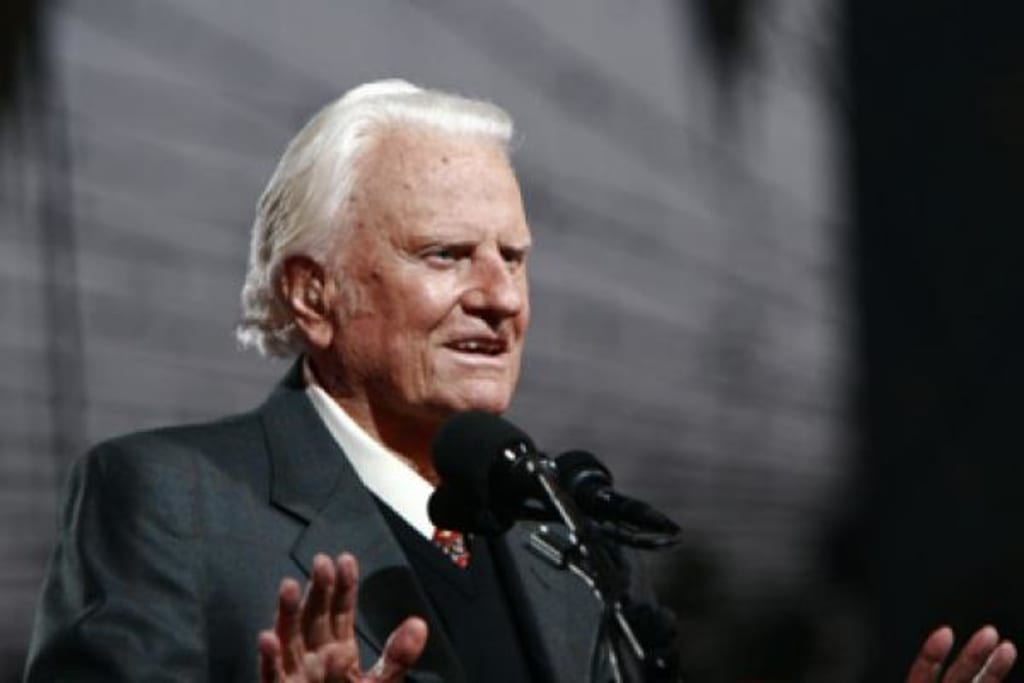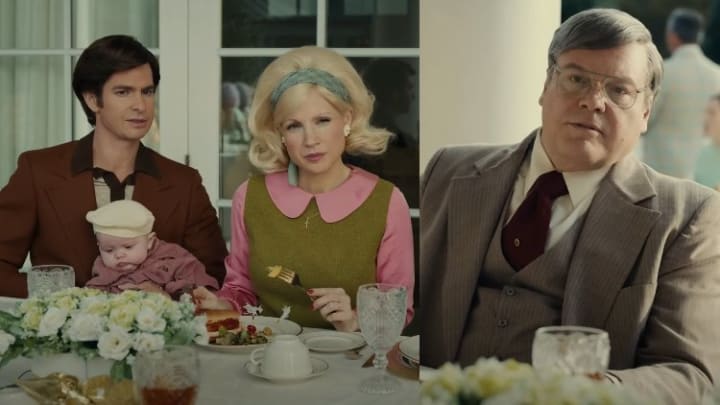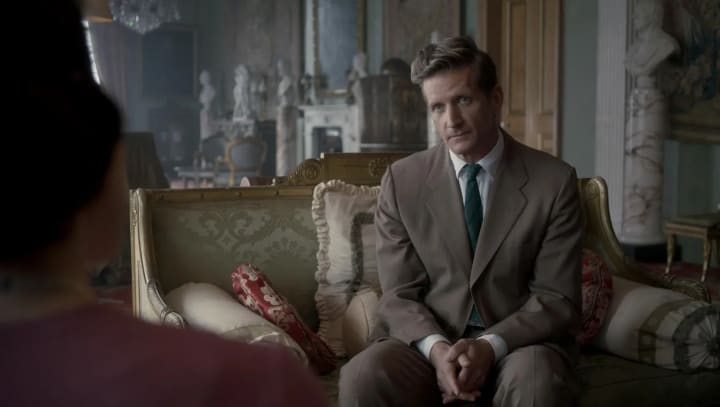Billy Graham’s Legacy
The utility of preaching to the choir

When Billy Graham’s last remaining sibling, Jean Ford, passed away recently, Ken Garfield, the former religion editor of the Charlotte Observer, called it the “end of an era.” Graham himself passed away in 2018, aged 99, and with the passing of Pat Robertson last year, we truly have probably seen the last of the big televangelists of the past.
These people leave behind a divided legacy, though I think with Graham it definitely leans more towards the positive than some of his fellow evangelists, such as Jerry Falwell, portrayed as fairly villainous by Vincent D’Onofrio in the recent movie ‘The Eyes of Tammy Faye.’

Graham, contrary to the evangelist image, was a softly spoken, endearing man. He was accessible, friendly, and, contrary to what you might think, relatively open minded. There are several interviews he conducted with known atheists and people on the complete opposite end of the social spectrum. His sit-downs with Woody Allen and Larry King are incredibly witty and insightful, respectively. At no point does Graham ever try and force religion on these people or criticise them for their lack of faith. And this is the image I got of him only weeks before he died when I saw him portrayed in the Netflix drama ‘The Crown’ where he befriends Queen Elizabeth II, helping her understand her Christian faith in difficult times. Furthermore, the monarch, as defender of the faith but also on a more personal level with regards to the late Queen, was already a deeply Christian individual.

The majority of the people that Graham preached to all over the world were indeed Christian people. Even the phrase “America’s pastor” alludes to this as the country is, or at least fundamentally was when Graham was at the height of is career, a majority Christian nation. And perhaps this is why I find Graham such an admirable man. Evangelists are always going to divide people. Nobody likes people who force their views down your throat. That goes for both the highly religious and militant atheists, generally. I mean, people can preach want they want, but to demonstrate my point, for example, I’m a Catholic, and I wouldn’t go around trying to convert people to Catholicism (certainly not on Vocal where it violates the guidelines for one) because they’d simply point out the flaws in Catholic dogma and the copious reforms the church probably needs. I think it’s better to, as Jordan Peterson says, “put your own house in order before you criticise the world.” That’s why Sam Harris’s criticisms of radical Islam often fall on deaf ears when aired to Muslims, but the nuanced approach of Muslim reformers such as Sarah Haider are more likely to be heard.
To give a religious example, whether you believe it or not, most of the people Jesus preached to in the Bible stories were already firm believers in an Abrahamic faith. He merely reformed it. And, yes, there is a long history of missionaries preaching to people of completely opposing belief systems, but I think the best audience for Christian evangelists is people who are already faithful in the Christian sense, but need a leader and teacher to look to to guide them in their faith. And this I can appreciate. Billy Graham definitely did this from where I’m sitting.
But he was not the only big televangelist of that era. Falwell was another one. Someone I have less time for. His approach was more “fire and brimstone,” criticising anybody who didn’t follow his extremely conservative beliefs as evil and going around proclaiming other religions were evil and 9/11 was God’s punishment on America. And making millions doing so.
On the contrary, Billy Graham remained politically neutral, a wise and gentle guide for many presidents. He was not interested in chastising other religions and denominations, and was actually widely criticised by Protestants for his ecumenism. And his speech following 9/11 is very moving and nothing like Jerry Falwell’s comments on the matter. He also lived a very modest life in terms of spending.

The man used the technology on offer to him to become a guide and advisor for a largely Christian nation. He proves, I would say, the utility of preaching to the choir. The religious are probably the people who need his form of guidance most of all.
Through his use of technology he holds the world record for how many people he preached the gospels to. Billy Graham was a guide for people who needed guidance. Again, that era leaves behind a divided legacy, but I think if you look at it from this angle someone like Graham definitely did more good than harm.
About the Creator
Matty Long
Jack of all trades, master of watching movies. Also particularly fond of tea, pizza, country music, watching football, and travelling.
X: @eardstapa_






Comments (2)
I couldn't agree with you more on this, Matty. And that scene where Tammy Faye sits down with the men & calls him "Jerry" is one of my favorites of all-time. "That's Rev. Falwell," he sputtered with undisguised disdain. "Okay, Jerry," Tammy Faye responded & went right on discussing the issues at hand, lol. My understanding of the gospel Jesus preached & taught is the simple good news that, no matter what others might tell you, God loves you & God's grace is always for you. And if we want to know what it's like to live in God's reign, all we need do is afford one another those same courtesies. The names & terms we use only matter as a means to understand what the good news is & quite frankly, I don't think Jesus cared one bit what names or words others used. He met them where they were in their faith & let them know, even when they were against him, he wasn't against them. For me, that's the very nature of evangelism. It's not converting others to our way of thinking. It's listening to them as well as sharing with them in a way that allows the good news to emerge & blossom among us: that the love we so yearn both to extend & to receive is right here, right now. All we need do is allow ourselves to be open to & begin living it. Yep, love the article, Matty.
A very interesting study of a man I've been quite ambivalent about. Thanks.